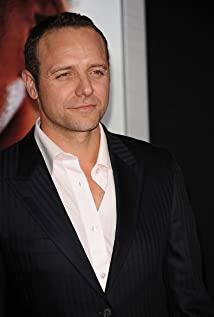The philosophical discussion part of this film is heavier than the case-solving part, but the narrative techniques are traditionally structured and exquisite, and the sophistication is a repetitive sculpting, which makes the eyes shine. It's been a long time since I saw such an old-school film that can arrange all the dog blood routines so clearly that it is not so bloody. But I scored five points because I was also a lonely monster, and I resonated well with the two protagonists. It does not mean that the film is perfect. The obvious problem is that the blood part is too bloody, and the depth of the theme is still limited. These two points will be detailed later.
This film is easy to deceive people. I was recommended by the Netflix homepage. I just watched it. I didn’t have any mental preparation. It was a general crime-solving routine. So when I saw the male protagonist being solitary and being invited out of the mountain, I had a warning in my head. It rang unreservedly, this must be a genius who has been squeezed out, the murderer killed his family and other tough guys due to two heroes. But soon he slapped his face.
1. Philosophical discussion. I saw some people in the comments saying that Ted's theory is neither advanced nor new. First of all, if a theory is not new, it does not mean that it is incorrect or problematic. There are many long-standing problems in the history of human philosophy. Secondly, Ted’s own retreat was caused by personal experience, and his theory actually hoped that mankind would slow down the speed of industrialization. How to slow it down? In fact, there is no way to slow it down. His violence is a way of conveying information: he has no choice but to appeal. It's just that his "appeal" method ignores human life. Thirdly, whether a theory is displayed deeply in a TV series depends on the skill of the TV series. I can pick a very high-end theoretical theme, but how deep the screenwriter can dig is a question. In the category of TV dramas, this drama can be said to be quite good at digging into an argument. Every scene in it repeatedly emphasizes the key points and changes the angle of the line to make it clear what he wants to say.
2. Two black sleeps. The male protagonist and Ted are two sides. The design of the male protagonist is very targeted, but it is a bit too literary and lacks a sense of randomness in reality, but this is extremely demanding, generally high Symmetrical, one-sided, double-protagonist dramas, if done well, are more profound and complicated, such as the Japanese drama "Sodom’s Apple", where the dual heroines are very similar to the dual heroes of this drama. It's just that the Japanese drama explored family psychology. Going back to this drama, I would like to say that I have not seen such a diligent handwriting for a long time. Generally, suspense detective dramas like to leave a lot of blank space for reflection. If it is not done well, it is inexplicable, even if it is done well. It will also make people a headache for a while, but what about this show? Fill in the blanks with all my energy, even the fictional characters (male protagonists) have to fill them up completely! What a sincerity this is!
First of all, we must admit that the only protagonist of this drama is actually Ted, and the hero is only fictionalized to describe his life. Let's take a look at how Ted is actually described: First, describe how the black sheep in the male lead system is consciously unwilling to obey, unwilling to be a screw, the sense of separation from the social family, and the sense of resistance that gradually awakened in the process of solving the case. , Through this complete set of about five episodes to describe the correctness of Ted's concept. Then the sixth episode is used to positively describe the source of Ted's excessive violence: having a set of anti-social theories and violent expressions are not the same thing, the male protagonist is the proof. So the whole drama is to pull out a philosophical discussion: Is the part of freedom lost in order to obey the social system worth our attention?
I can analyze this problem quantitatively from a more realistic perspective, but TV dramas do not have this condition, and can only analyze perceptually. That is to say, this aspect is a little bit bloody, and it is not logical enough: for example, we have been looking at the process of solving the case from the perspective of God who knows who the murderer is. Naturally, everyone feels that everyone is working in the right direction like a idiot, and against the male lead, and finally grabs the credit. But what does it look like without the perspective of God? Imagine that you are a special case team, and all the employees have worked together for seventeen years to establish a criminal profile. You will also recruit talents from various fields to deepen the theory every day. Suddenly someone who engages in word games comes to tell you Because of spelling problems, your seventeen years of work were all wrong? As a member of a society, an efficient organization in the social system, would you care about this heresy? Based on our experience, is it okay for the 17-year research to be generally correct instead of the newcomer? Every time the male protagonist puts forward a claim, the reason for rejection is also sufficient: there is a theory that more tangible evidence is better than the male protagonist's subjective inference. Detecting a case is so full of randomness. Of course, the most reliable evidence is physical evidence, but even the evidence depends on luck. What I’m saying is a bit awkward. The old computer man who has never been right may be the star to solve the case. The prisoner just happened to have the same idea with the male lead this time. The male lead can catch him, if not? In terms of legal language, the conclusions drawn by forensic linguistic appraisal have a "certain" corroborating force, but they are not conclusive evidence. Generally speaking, it is reasonable to be used as indirect evidence and auxiliary evidence: because it may be wrong. of! Let me emphasize again, the success of the male lead is very random! So the suppression he received in the task force was reasonable and logical. Some people want to say why they rob him of the credit. This is too much. I think it has been emphasized many times in the play: You cannot have both fish and bear's paws. The male protagonist is a person who ignores the rules and does not know how to obey orders in order to insist on his own opinions. In a highly institutionalized task force, a disobedient soldier will cause more trouble than solving the case. Just imagine if it is in a precision instrument. , All kinds of screws suddenly felt that I would do what I wanted, then the instrument would be paralyzed immediately, and no conclusions could be drawn! And every screw will feel that I am right. Even if they are given the conditions to do it alone, some of them are bound to be wrong. The overall efficiency is definitely not as good as a step-by-step institutional organization. Such sophisticated organizations are everywhere in modern society, and the military is an extreme manifestation of this phenomenon: you only need to obey, and if you don’t obey, the consequences will be very serious. This is the necessary unconsciousness. The male protagonist stubbornly chooses to be a maverick, then he must be "controlled", and the task force must give him a Only the reins can use him. The old computer man is incompetent but absolutely obedient. This is what social groups want. From another perspective, no one in his career dared to erase his credit, it was just a face-saving project in the external press conference.
Being enslaved and disgusted and isolated, you can choose one! Can't have both.
The discussion of this drama basically ends here. This is a pity, and the narrative language of this drama is not neutral enough. The suppression of the male protagonist I mentioned above was shown to be unbearable. Of course, the main creator The team has a deliberate pursuit of highlighting the theme, but the true depth actually comes from not exaggerating and not modifying the behavior of any party. If the narrative lens can make the team's suppression of the male lead more reasonable, it will be better.
3. Childhood experience. The lens language is still very mature, but based on personal feelings, it must be said that I don't like this paragraph very much. This whole paragraph is in the wrong direction, showing how a person with a naturally problematic personality develops a hatred of the world. Of course, this is one aspect of Ted, but it greatly weakens the objectivity of Ted's will to defend his views. It seems to have been stimulated to retaliate against the society. It is subjective and malicious to people. This is too low. It makes us forget that his point of view is very objective. He doesn't care about killing, but the purpose is not to kill. The whole drama was downgraded to the level of soap operas such as criminal minds at this moment. What I dislike the most is to describe him as a victim. His loneliness should be a natural result of his inability to integrate as a person in the society. Of course, it should not be suppressed by a professor doing experiments. Since the topic is about the problem of industrial society, why find a "bad guy" to grab the limelight?
View more about Manhunt reviews











